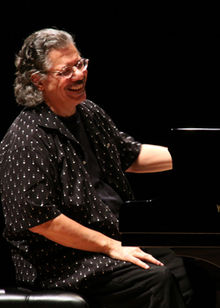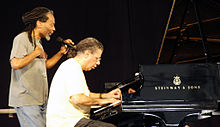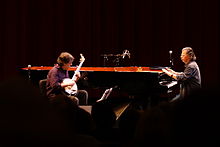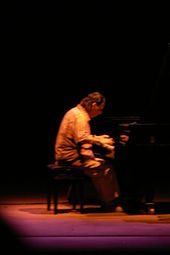- Chick Corea
-
Chick Corea 
Chick Corea in 2009Background information Birth name Armando Anthony Corea Born June 12, 1941 Origin Chelsea, Massachusetts, U.S. Genres Jazz, jazz fusion, post bop, latin jazz, classical music, avant-garde jazz Occupations Pianist, keyboardist, composer, bandleader Instruments Piano, keyboards, synthesizers, organ, vibraphone, drums Years active 1962–present[1] Labels ECM, Polydor, Stretch, Warner Bros. Associated acts Return to Forever, Five Peace Band, Chaka Khan Website chickcorea.com Armando Anthony "Chick" Corea (born June 12, 1941)[2] is an American jazz pianist, keyboardist, and composer.
Many of his compositions are considered jazz standards. As a member of Miles Davis' band in the 1960s, he participated in the birth of the electric jazz fusion movement. In the 1970s he formed Return to Forever.[2] Along with Herbie Hancock, McCoy Tyner and Keith Jarrett, he has been described as one of the major jazz piano voices to emerge in the post-John Coltrane era.[3]
His career has been driven by his will to operate as a free agent and compulsively explore different avenues of music making. This hunger has positioned him as an important catalyst in the world of serious, mainstream acoustic jazz, and he is one of the most influential and widely studied figures in the last 40 years.[4]
Corea continued to pursue other collaborations and to explore various musical styles throughout the 1980s and 1990s. He is also known for promoting and fundraising for a number of social issues, such as eradicating social illiteracy,[5] and is a Scientologist.[6]
Contents
Life and career
Youth
Armando Corea was born in Chelsea, Massachusetts. He is of Sicilian and Spanish descent.[7] His father, a jazz trumpet player who had led a Dixieland band in the Boston area in the 1930s and 1940s, introduced him to the piano at the age of four. Growing up surrounded by jazz music, he was influenced at an early age by bebop and stars such as Dizzy Gillespie, Charlie Parker, Bud Powell, Horace Silver, and Lester Young. At eight Corea also took up drums, which would later influence his use of the piano as a percussion instrument.
Corea developed his piano skills by exploring music on his own. A notable influence was concert pianist Salvatore Sullo from whom Corea started taking lessons at age eight and who introduced him to classical music, helping spark his interest in musical composition. He also spent several years as a performer and soloist for the Knights of St. Rose, a drum and bugle corps based in Chelsea.
Given a black tuxedo by his father, he started doing gigs when in high school. He enjoyed listening to Herb Pomeroy's band at the time, and had a trio which would play Horace Silver's music at a local jazz club.
He eventually decided to move to New York where he studied musical education for one month at Columbia University and six months at The Juilliard School. He quit after finding both disappointing, but liked the atmosphere of New York where the musical scene became the starting point for his professional career.
Early career
Corea's first major professional gig was with Cab Calloway. Corea started his professional career in the 1960s playing with trumpeter Blue Mitchell and Latin greats such as Herbie Mann, Willie Bobo and Mongo Santamaría. One of the earliest recordings of his playing is with Blue Mitchell's quintet on The Thing To Do. This album features his composition "Chick's Tune", a clever retooling of "You Stepped Out of a Dream" that demonstrates the angular melodies and Latin-and-swing rhythms that characterize, in part, Corea's personal style. (Incidentally, the same tune features a drum solo by a very young Al Foster.)
His first album as a leader was Tones for Joan's Bones in 1966, two years before the release of his album Now He Sings, Now He Sobs, with Roy Haynes on drums and Miroslav Vitouš on bass.[2]
He made another sideman appearance with Stan Getz on 1967's Sweet Rain (Verve Records).[2]
Avant garde period
From 1968 to 1971 Corea had associations with avant garde players and his solo style revealed a dissonant, avant garde orientation. His avant garde playing can be heard on his solo works of the period, his solos in live recordings under the leadership of Miles Davis, his recordings with Circle, and his playing on Joe Farrell's Song of the Wind album on CTI Records.
In September 1968 Corea replaced Herbie Hancock in the piano chair in Davis' band and appeared on landmark albums such as Filles de Kilimanjaro, In a Silent Way, and Bitches Brew. In concert, Davis' rhythm section of Corea, Dave Holland, and Jack DeJohnette combined elements of free jazz improvisation and rock music.[citation needed] Corea experimented using electric instruments with the Davis band, mainly the Fender Rhodes electric piano.
In live performance he frequently processed the output of his electric piano with a device called a ring modulator, producing sounds reminiscent of composer Karlheinz Stockhausen. Using this style, he appeared on multiple Davis albums, including Black Beauty: Live at the Fillmore West and Miles Davis at Fillmore: Live at the Fillmore East. His live performances with the Miles Davis band continued into 1970, with a great touring band of Steven Grossman, tenor sax, Keith Jarrett, additional electric piano and organ, Jack DeJohnette, drums, Dave Holland, bass, Airto Moreira, percussion, and Miles on trumpet.[2]
Holland and Corea left to form their own group, Circle, active between 1970 and 1971. This free jazz group featured multi-reed player Anthony Braxton and drummer Barry Altschul. This band was documented on Blue Note and ECM. Aside from soloing in an atonal style, Corea sometimes reached in the body of the piano and plucked the strings. In 1971 or 1972 Corea struck out on his own.
The concept of communication with an audience became a big thing for me at the time. The reason I was using that concept so much at that point in my life – in 1968, 1969 or so – was because it was a discovery for me. I grew up kind of only thinking how much fun it was to tinkle on the piano and not noticing that what I did had an effect on others. I did not even think about a relationship to an audience, really, until way later.[8]
Jazz fusion
 Bobby McFerrin and Chick Corea, New Orleans Jazz and Heritage Festival in 2008
Bobby McFerrin and Chick Corea, New Orleans Jazz and Heritage Festival in 2008
In the early 1970s Corea took a profound stylistic turn from avant garde playing to a crossover jazz fusion style that incorporated Latin jazz elements. He founded Return to Forever in 1971. This band had a fusion sound and even though it relied on electronic instrumentation it drew more on Brazilian and Spanish-American musical styles than on rock music. On its first two records, Return to Forever featured Flora Purim's vocals, the Fender Rhodes electric piano, and Joe Farrell's flute and soprano saxophone. Airto Moreira played drums. Corea's compositions for this group often had a Brazilian tinge. In 1972 Corea played many of the early Return to Forever songs in a group he put together for Stan Getz. This group, with Stanley Clarke on bass and Tony Williams on drums, recorded the Columbia label album Captain Marvel under Getz's name.
Only Clarke remained from the group's first lineup; Bill Connors played electric guitar and Lenny White played drums. No one replaced vocalist Purim. (Briefly, in 1977, Corea's wife, Gayle Moran, served as vocalist in the band.) In 1974 Al Di Meola joined the band, replacing Connors. In this second version of Return to Forever, Corea extended the use of synthesizers, particularly Moogs. The group released its final studio record in 1977. Thereafter, Corea focused on solo projects.[2]
Corea's composition "Spain" first appeared on the 1972 Return to Forever album Light as a Feather. This is probably his most popular piece, and it has been recorded by a variety of artists. There are also a variety of subsequent recordings by Corea himself in various contexts, including an arrangement for piano and symphony orchestra that appeared in 1999, and a collaborative piano and voice-as-instrument arrangement with Bobby McFerrin on the 1992 album Play. Corea usually performs "Spain" with a prelude based on Joaquín Rodrigo's Concierto de Aranjuez (1940), which earlier received a jazz orchestration on Miles Davis' and Gil Evans' "Sketches of Spain".
In 1976 he issued My Spanish Heart, influenced by Latin American music and featuring vocalist Moran and electric violinist Jean-Luc Ponty.
The late Ana Mazzotti, a Brazilian jazz pianist and vocalist, dedicated what is perhaps her last ever recorded track, "Grand Chick", to Corea. The song may be found on her "Ao Vivo Guaruja 1982" album. As Ana Mazzotti worked with Brazilian jazz fusion masters Azymuth in her first album, it was further testament to Corea's influence in the genre.
Duet projects
In the 1970s Corea started working occasionally with vibraphonist Gary Burton, with whom he recorded several duet albums on ECM, including 1972's Crystal Silence. They reunited in 2006 for a concert tour. A new record called The New Crystal Silence (which has received 3 nominations for the 51st Grammy Awards) was issued shortly into 2008. The package includes a disc of duets and another disc featuring the Sydney Symphony.
Later, toward the end of the 1970s, Corea embarked on a series of concerts and two albums with Herbie Hancock. These concerts were presented in elegant settings with both pianists formally dressed, and performing on Yamaha concert grand pianos. The two jazz greats traded playing each other's compositions, as well as pieces by other composers such as Béla Bartók.
In December 2007 Corea recorded a duet album, The Enchantment, with banjoist Bela Fleck.[9] Fleck and Corea toured extensively behind the album in 2007. Fleck was nominated in the Best Instrumental Composition category at the 49th Grammy Awards for the track "Spectacle."[10]
In 2008 Corea collaborated with Japanese pianist Hiromi Uehara on the live album Duet (Chick Corea and Hiromi). The duo played a concert at Tokyo's Budokan arena on April 30.[11]
Later work
 Corea performs with Béla Fleck, March 1, 2008
Corea performs with Béla Fleck, March 1, 2008
Corea's other bands include the Elektric Band, the Akoustic Band, and Origin.
The Akoustic Band released a self-titled album in 1989, and featured John Patitucci on bass and Dave Weckl on drums. It marked a turn back toward traditional jazz in Corea's career, and the bulk of his subsequent recordings have been acoustic ones. The Akoustic Band also provided the music for the 1986 Pixar short Luxo Jr. with their song The Game Maker.
In 1992 Corea started his own record label, Stretch Records.[2]
In 2001 the Chick Corea New Trio, with Avishai Cohen and Jeff Ballard on bass and drums, respectively, released the album Past, Present & Futures. The 11-song album includes only one standard composition (Fats Waller's "Jitterbug Waltz"). The rest of the tunes are Corea originals.
He also participated in 1998's Like Minds, which features Gary Burton on vibes, Pat Metheny on guitar, Dave Holland on bass and Roy Haynes on drums.
Recent years have also seen Corea's rising interest in contemporary classical music. He composed his first piano concerto – and an adaptation of his signature piece, Spain for a full symphony orchestra – and performed it in 1999 with the London Philharmonic Orchestra. Five years later he composed his first work not to feature any keyboards: His String Quartet No. 1 was specifically written for the Orion String Quartet and performed by them on 2004's Summerfest.
Corea has continued releasing jazz fusion concept albums such as To the Stars (2004) and Ultimate Adventure (2006). The latter album won the Grammy Award for Best Jazz Instrumental Album, Individual or Group.
In 2008 the second version of Return to Forever (Corea, keyboards; Stanley Clarke, bass; Lenny White, drums; Al Di Meola, guitar) reunited for a worldwide tour. The reunion received positive reviews from most jazz and mainstream publications.[12] Most of the group's studio recordings were re-released on the compilation Return to Forever: The Anthology to coincide with the tour. A concert DVD recorded during their performance at the Montreux Jazz Festival was released in May 2009. He is recently working on a collaboration CD with the Grammy Award winning jazz vocal group The Manhattan Transfer, due to be released in August 2009.
A new group, the 5 Peace Band, which features Corea and guitarist John McLaughlin, began a world tour in October 2008. Corea had previously worked with McLaughlin in Miles Davis' late 1960s bands, including the group that recorded Davis' album Bitches Brew. Joining Corea and McLaughlin in the 5 Peace Band are saxophonist Kenny Garrett and bassist Christian McBride. Drummer Vinnie Colaiuta played with the band in Europe and on select North American dates; Brian Blade played all dates in Asia and Australia, and most dates in North America.
Scientology
Corea says that Scientology has helped deepen his relationships with others, and helped him find a renewed path.[3] Under the "special thanks" notes, found in all of his later albums, Corea mentions that L. Ron Hubbard, founder of Scientology, has been a continual source of inspiration. In 1968 Corea discovered Dianetics, Hubbard's principal work, and in the early 1970s developed an interest in Hubbard's science fiction novels. The two exchanged letters until Hubbard's death in 1986, and Corea had three guest appearances on Hubbard's 1982 album Space Jazz: The Soundtrack of the Book Battlefield Earth, noting, "[Hubbard] was a great composer and keyboard player as well. He did many, many things. He was a true Renaissance Man."[6]
Corea said that Scientology became a profound influence on his musical direction in the early 1970s:
I no longer wanted to satisfy myself. I really want to connect with the world and make my music mean something to people.[13]Due to Corea's religious affiliation, he was banned from performing in a concert to be held in Stuttgart, Germany, on August 15, 1993.[14] Members of the U.S. Congress sent letters to the German government concerning a violation of basic human rights that are upheld by the German Constitution. The ban was not upheld, and in later years Corea performed in festivals in Germany, including several times at the government-supported International Jazz Festival in Burghausen where he was awarded a plaque in Burghausen's "Street of Fame" in 2011.[15]
In 1998, Corea and fellow entertainers Anne Archer, Isaac Hayes, and Haywood Nelson attended the 30th anniversary of Freedom Magazine, the Church of Scientology's investigative news journal, at the National Press Club in Washington, D.C., to honor 11 human rights activists.[16]
Discography
Main article: Chick Corea discographyAwards
Over the years, he has been nominated for 51 Grammy Awards out of which he has won 15:
His 1968 album Now He Sings, Now He Sobs was inducted in the Grammy Hall of Fame in 1999.
In 2010, he was named doctor honoris causa at Norwegian University of Science and Technology (NTNU).[17]
See also
References
- ^ Yanow, Scott (June 12, 1941). "Chick Corea". AllMusic. http://www.allmusic.com/artist/chick-corea-p66463/biography. Retrieved July 1, 2011.
- ^ a b c d e f g allmusic Biography
- ^ a b Heckman, Don (August 18, 2001). "Playing in His Key". Los Angeles Times. http://articles.latimes.com/2001/aug/18/entertainment/ca-35464. Retrieved June 7, 2011.
- ^ Ratliff, Ben (November 30, 2000). "Jazz Veteran Is Most at Home When He's Away; With His Playing and His Label, Chick Corea Is Newly Influential". New York Times. http://www.nytimes.com/2000/11/30/arts/jazz-veteran-most-home-when-he-s-away-with-his-playing-his-label-chick-corea.html. Retrieved June 7, 2011.
- ^ "Literacy 2005: Celebrities, Church of Scientology Vow To Eradicate Social Ill". Vol. 36, Iss. 43 (Sacramento Observer): pp. F2. September 15, 1999.
- ^ a b "All About Jazz". http://www.allaboutjazz.com/php/article.php?id=15351. Retrieved March 24, 2008.
- ^ "Chick Corea: Brazil – Jazz.com | Jazz Music – Jazz Artists – Jazz News". Jazz.com. November 20, 1999. http://www.jazz.com/music/2007/11/5/chick-corea-brazil. Retrieved July 1, 2011.
- ^ "Chick Corea Interview on ArtistInterviews". http://www.artistinterviews.eu/?page_id=6&parent_id=22. Retrieved March 28, 2008.
- ^ Levine, Doug (April 24, 2007). "Chick Corea, Bela Fleck Collaborate On New CD". VOA News (Voice of America). http://www.voanews.com/english/archive/2007-04/2007-04-24-voa68.cfm. Retrieved January 1, 2009.
- ^ Concord Music Group :
- ^ [1][dead link]
- ^ Chinen, Nate (August 3, 2008). "The Return of Return to Forever". The New York Times. http://www.nytimes.com/2008/08/03/arts/music/03chin.html. Retrieved April 1, 2010.
- ^ Down Beat, October 21, 1976, p.47
- ^ Hennessey, Mike (January 18, 2011). "U.S. lawmakers rip Germany's ban of Corea show. (controversy over US musician Chick Corea's religious beliefs)". Billboard. http://books.google.com/books?id=6BEEAAAAMBAJ&pg=PA16&lpg=PA16&dq=billboard+magazine+%2B+Germany's+ban+of+Corea+show&source=bl&ots=bNzTHOxVH6&sig=zOEiQow0eDr8U2KCsMjTektvGrc&hl=en&ei=7XH2TdGdCY74sAOOkpTaCw&sa=X&oi=book_result&ct=result&resnum=1&ved=0CBoQ6AEwAA#v=onepage. Retrieved June 9, 2011.
- ^ Haserer, Wolfgang (January 18, 2011). "Musikalisch unumstritten". OVB Online. http://www.ovb-online.de/kultur/musikalisch-unumstritten-1085897.html. Retrieved June 13, 2011.
- ^ Haywood You Remember Garden City Park
- ^ "Chick Corea utnevnt til æresdoktor – NRK Trøndelag – NRK Nyheter". Nrk.no. http://www.nrk.no/nyheter/distrikt/nrk_trondelag/1.7355183. Retrieved July 1, 2011.
External links
- Official site
- Official discography
- Jazzreview.com biography
- Verve Records Archived October 13, 2007 at the Wayback Machine
- An Interview with Chick Corea by Bob Rosenbaum, July 1974 (PDF file) "You put these notes together and you come out with that sound, and isn't it beautiful. So what? What does it do to another person? What does it do to your neighborhood?"
- Chick Corea talks to Michael J Stewart about his Piano Concerto
Chick Corea As Leader Tones for Joan's Bones • Now He Sings, Now He Sobs • Is • Sundance • The Song of Singing • The Leprechaun • My Spanish Heart • The Mad Hatter • Secret Agent • Friends • Tap Step • Three Quartets • Touchstone • Again and Again • Summer Night - live • Chick Corea Akoustic Band • Alive • Time Warp • Rendezvous in New York • The Ultimate Adventure • Super Trio • Five Peace Band LiveSolo albums Piano Improvisations Vol. 1 • Piano Improvisations Vol. 2 • Delphi I • Delphi II & III • Expressions • Children's Songs • Solo Piano - Originals • Solo Piano - StandardsCollaborations An Evening With Herbie Hancock & Chick Corea: In Concert • CoreaHancock • Chick Corea & Lionel Hampton in Concert • Voyage • Play • The Mozart Sessions • The Enchantment • Duetwith Gary Burton Crystal Silence • Duet • In Concert, Zürich, October 28, 1979 • Lyric Suite for Sextet • Native Sense - The New Duets • Like minds • The New Crystal Silencewith Circle Circling In • Circulus • Circle 1: Live in Germany Concert • Paris Concert • Circle 2: Gatheringwith Miles Davis Water Babies • Filles de Kilimanjaro • In a Silent Way • Bitches Brew • A Tribute to Jack Johnson • Black Beauty: Live at the Fillmore West • Miles Davis at Fillmore: Live at the Fillmore East • Circle in the Round • Live-Evil • On the Corner • Big Funwith Elektric Band The Chick Corea Elektric Band • Light Years • Eye of the Beholder • Inside Out • Beneath the Mask • Elektric Band II: Paint the World • Live From Elario's (First Gig) • To the Starswith Joe Farrell Joe Farrell Quartet • Outback • Skate Board Parkwith Stan Getz Sweet Rain • Captain Marvelwith Herbie Mann Latin Mann Afro to Bossa to Blues • Standing Ovation at Newport • The Roar of the Greasepaint, the Smell of the Crowd • Monday Night at the Village Gatewith Blue Mitchell The Thing to Do • Down with It! • Boss Hornwith Origin Live at the Blue Note • A Week at The Blue Note • Change • corea.concerto – Spain For Sextet & Orchestra – Piano Concerto No.1with Return to Forever Return to Forever • Light as a Feather • Hymn of the Seventh Galaxy • Where Have I Known You Before • No Mystery • Romantic Warrior • Musicmagic • Live • Return to Forever – Returnswith Others Flute By-Laws • Moto Grosso Feio • Turkish Women At The Bath • The Creeper • Merry-Go-Round • Going to the Rainbow • Round Trip • Echoes of an Era • Big BandCompilations The Complete "Is" Sessions • Chick Corea/Herbie Hancock/Keith Jarret/McCoy Tyner • Best of Chick Corea • Very Best of Chick Corea • Herbie Mann-Chick Corea The complete Latin band SessionsSoundtracks Related Categories:- 1941 births
- Living people
- American jazz composers
- American jazz musicians of Italian descent
- American jazz pianists
- American people of Sicilian descent
- American people of Spanish descent
- American Scientologists
- Crossover (music)
- ECM artists
- Grammy Award winners
- GRP Records artists
- Jazz fusion pianists
- Keytarists
- Latin Grammy Award winners
- Miles Davis
- People from Chelsea, Massachusetts
- Post-bop pianists
- Return to Forever members
Wikimedia Foundation. 2010.

